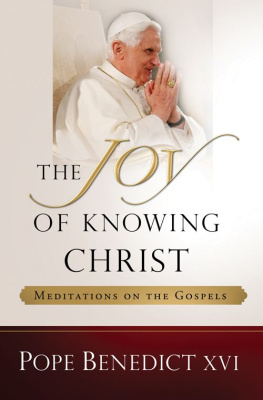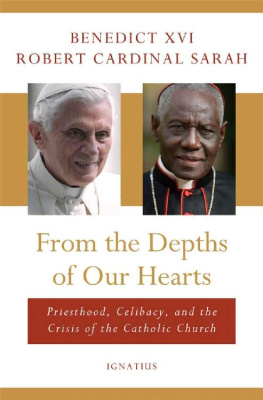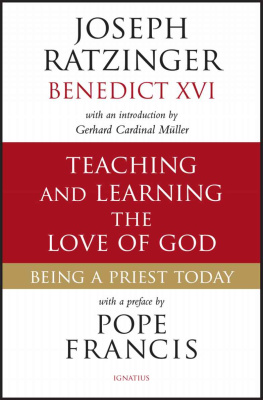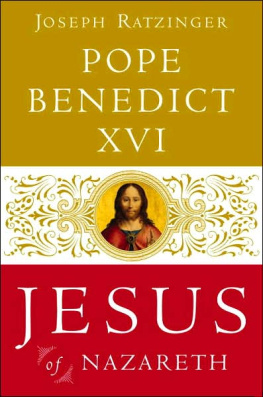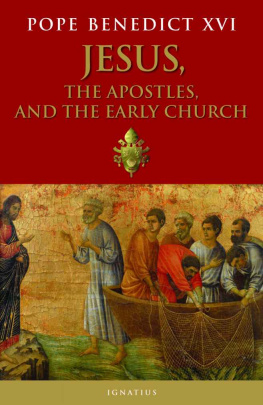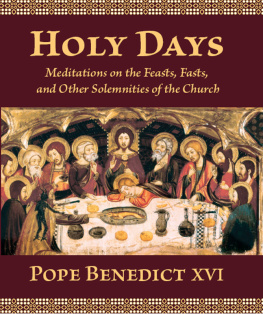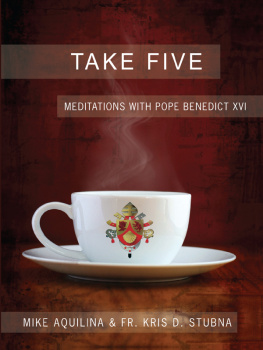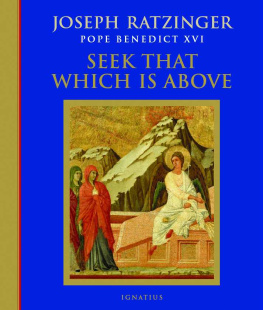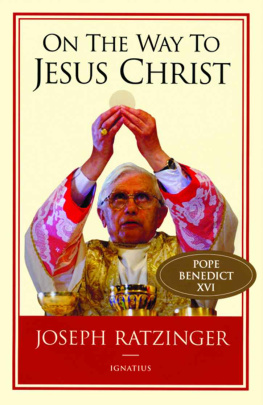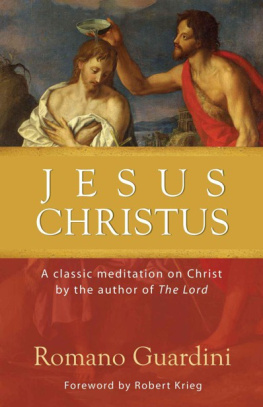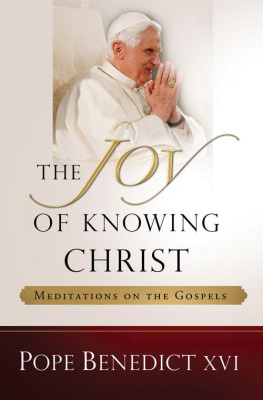Pope Benedict XVI - The Joy of Knowing Christ: Meditations on the Gospels
Here you can read online Pope Benedict XVI - The Joy of Knowing Christ: Meditations on the Gospels full text of the book (entire story) in english for free. Download pdf and epub, get meaning, cover and reviews about this ebook. year: 2009, publisher: The Word Among Us Press, genre: Religion. Description of the work, (preface) as well as reviews are available. Best literature library LitArk.com created for fans of good reading and offers a wide selection of genres:
Romance novel
Science fiction
Adventure
Detective
Science
History
Home and family
Prose
Art
Politics
Computer
Non-fiction
Religion
Business
Children
Humor
Choose a favorite category and find really read worthwhile books. Enjoy immersion in the world of imagination, feel the emotions of the characters or learn something new for yourself, make an fascinating discovery.
- Book:The Joy of Knowing Christ: Meditations on the Gospels
- Author:
- Publisher:The Word Among Us Press
- Genre:
- Year:2009
- Rating:4 / 5
- Favourites:Add to favourites
- Your mark:
- 80
- 1
- 2
- 3
- 4
- 5
The Joy of Knowing Christ: Meditations on the Gospels: summary, description and annotation
We offer to read an annotation, description, summary or preface (depends on what the author of the book "The Joy of Knowing Christ: Meditations on the Gospels" wrote himself). If you haven't found the necessary information about the book — write in the comments, we will try to find it.
The Joy of Knowing Christ: Meditations on the Gospels — read online for free the complete book (whole text) full work
Below is the text of the book, divided by pages. System saving the place of the last page read, allows you to conveniently read the book "The Joy of Knowing Christ: Meditations on the Gospels" online for free, without having to search again every time where you left off. Put a bookmark, and you can go to the page where you finished reading at any time.
Font size:
Interval:
Bookmark:

M EDITATIONS ON THE G OSPELS
P OPE B ENEDICT XVI

M EDITATIONS ON THE G OSPELS
P OPE B ENEDICT XVI

Copyright 2009 Libreria Editrice Vaticana
Compilation Copyright 2009 The Word Among Us Press
All rights reserved.
Published by The Word Among Us Press
7115 Guilford Road
Frederick, Maryland 21704
www.wau.org
14 13 12 11 10 5 6 7 8 9
ISBN: 978-1-59325-151-2
eISBN: 978-1-59325-432-2
Scripture texts used in this work, as well as Pope Benedict XVIs homilies and addresses, are taken from the Vatican translation and can be found on the Vatican Web site, www.vatican.va. Used with permission of Libreria Editrice Vaticana.
Cover design by John Hamilton Design
Cover photo of Pope Benedict XVI Catholic News Service.
Used with permission.
No part of this publication may be reproduced, stored in a retrieval system, or transmitted in any form or by any meanselectronic, mechanical, photocopy, recording, or any other, except for brief quotations in printed reviewswithout the prior permission of the author and publisher.
Made and printed in the United States of America
Library of Congress Cataloging-in-Publication Data
Benedict XVI, Pope, 1927-
The joy of knowing Christ : meditations on the Gospels / Pope Benedict XVI.
p. cm.
ISBN 978-1-59325-151-2 (alk. paper)
1. Bible. N.T. Gospels--Meditations. 2. Jesus Christ--Meditations. I. Title.
BS2555.54.B46 2009
242.5--dc22
2008040314
The words, Rejoice, because God is with you; he is with us, are words that truly open a new epoch. Dear friends, with an act of faith we must once again accept and understand in the depths of our hearts this liberating word: Rejoice!
Pope Benedict XVI
A s Pope Benedict XVI notes in the first meditation in this collection, knowing that there is a God who is good, who knows us, who is so near to us, is truly the gospelthe good news that brings us joy.
And the Holy Father is the bearer of good news in these fifty-five reflections on passages from the gospels. Taken from his homilies and Angelus messages over the past three years, the meditations here reveal the popes passionate love for Christ, his depth of faith, his grasp of Scripture, and his perspective on the challenges facing us as Christians in the world today. Pope Benedict is a brilliant theologian and scholar, but first and foremost he is a pastor, and this is evident in every meditation in this collection. A strong advocate of lectio divina, the prayerful reading of the Scriptures, he shows us how much nourishment and inspiration we can derive from meditating on the word of God.
The Word Among Us Press is delighted to bring you these reflections. We hope that as you meditate on the gospels with Pope Benedict, you will experience the great joy of which he speaksthat of knowing Christ and his overflowing love for you, his beloved son or daughter.
O n November 18. 1965, the Second Vatican Ecumenical Council approved the Dogmatic Constitution on Divine Revelation, Dei Verbum. This document is one of the pillars on which the entire council is built. It addresses Revelation and its transmission, the inspiration and interpretation of sacred Scripture and its fundamental importance in the life of the Church.
Gathering the fruits of the theological renewal that preceded it, Vatican II put Christ at the center, presenting him as both the mediator and the sum total of Revelation (Dei Verbum, 2). Indeed, the Lord Jesus, the Word made flesh who died and rose, brought to completion the work of salvation, consisting of deeds and words, and fully manifested the face and will of God so that no new public revelation is to be expected until his glorious return (see DV, 3).
The apostles and their successors, the bishops, are depositories of the message that Christ entrusted to his Church so that it might be passed on in its integrity to all generations. Sacred Scripture of the Old and New Testaments and sacred Tradition contain this message, whose understanding develops in the Church with the help of the Holy Spirit.
This same Tradition makes known the integral canon of the sacred books. It makes them directly understandable and operative so that God, who has spoken to the patriarchs and prophets, does not cease to speak to the Church and, through her, to the world (see DV, 8).
The Church does not live for herself but for the gospel, and it is always in the gospel that she finds the direction for her journey.
The conciliar constitution Dei Verbum emphasized appreciation for the Word of God, which developed into a profound renewal for the life of the eccclesial community, especially in preaching, catechesis, theology, spirituality, and ecumenical relations. Indeed, it is the Word of God which guides believers, through the action of the Holy Spirit, toward all truth (see John 16:13).
Among the many fruits of this biblical springtime I would like to mention the spread of the ancient practice of lectio divina or spiritual reading of sacred Scripture. It consists in poring over a biblical text for some time, reading it and rereading it, as it were, ruminating on it as the Fathers say and squeezing from it, so to speak, all its juice, so that it may nourish meditation and contemplation and, like water, succeed in irrigating life itself.
One condition for lectio divina is that the mind and heart be illumined by the Holy Spirit, that is, by the same Spirit who inspired the Scriptures, and that they be approached with an attitude of reverential hearing.
This attitude was typical of Mary Most Holy, as the icon of the annunciation symbolically portrays: the Virgin receives the heavenly messenger while she is intent on meditating upon the sacred Scriptures, usually shown by a book that Mary holds in her hand, on her lap or on a lectern.
This is also the image of the Church which the council itself offered in the constitution Dei Verbum: Hearing the Word of God with reverence... (1).
Let us pray that like Mary, the Church will be a humble handmaid of the divine Word and will always proclaim it with firm trust, so that the whole world... through hearing it may believe, through belief... may hope, through hope... may come to love (DV, 1).
Angelus, November 6, 2005
R ejoice!
Let us now meditate briefly on... one of the loveliest passages of sacred Scripture. And so as not to take too long, I would like to reflect on only three words from this rich gospel.
The first word on which I would like to meditate with you is the angels greeting to Mary. In the Italian translation the angel says, Hail, Mary. But the Greek word kaire means in itself be glad or rejoice.
And here is the first surprising thing: the greeting among the Jews was Shalom, Peace, whereas the greeting of the Greek world was Kaire, Be glad. It is surprising that the angel, on entering Marys house, should have greeted her with the greeting of the Greeks: Kaire
Next pageFont size:
Interval:
Bookmark:
Similar books «The Joy of Knowing Christ: Meditations on the Gospels»
Look at similar books to The Joy of Knowing Christ: Meditations on the Gospels. We have selected literature similar in name and meaning in the hope of providing readers with more options to find new, interesting, not yet read works.
Discussion, reviews of the book The Joy of Knowing Christ: Meditations on the Gospels and just readers' own opinions. Leave your comments, write what you think about the work, its meaning or the main characters. Specify what exactly you liked and what you didn't like, and why you think so.

